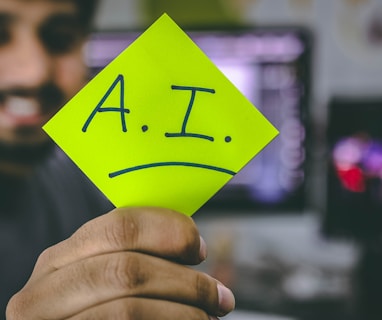How AI Can Help Us Achieve Sustainability
Artificial intelligence (AI) is rapidly changing the world, and its potential to help us achieve sustainability is vast. AI can be used to improve efficiency, reduce waste, and optimise resources in a wide range of industries and sectors.
3 min read


Artificial intelligence (AI) has emerged as a powerful tool in our pursuit of a sustainable future. By leveraging AI technology, industries worldwide are finding innovative ways to address environmental challenges, optimize processes, and drive positive change. In this blog, we will explore how AI is transforming various fields for sustainability and maximizing eco-friendly outcomes. From energy and agriculture to transportation and waste management, we will delve into the applications of AI and its potential to revolutionize industries. Additionally, we will provide a green goods guide to support your eco-friendly lifestyle choices and encourage sustainable consumption.
Here are some of the ways AI is being used to promote sustainability:
In the energy sector, AI can be used to develop more efficient solar and wind power technologies, optimise power grids, and reduce energy consumption in buildings. For example, Google's DeepMind AI has been used to develop a new type of solar cell that is more efficient and cheaper to produce. And IBM's Watson AI is being used to improve the efficiency of power grids by predicting demand and optimising the flow of electricity.
In the transportation sector, AI can be used to develop self-driving cars and trucks, optimise traffic flows, and reduce emissions from vehicles. For example, Waymo's self-driving car technology is already being tested on public roads in several cities. And Uber is using AI to optimise its ride-hailing platform, which has helped to reduce the number of empty cars on the road.
In the agriculture sector, AI can be used to develop more precise farming techniques, optimise water usage, and reduce food waste. For example, Monsanto's Climate FieldView AI uses satellite imagery and weather data to help farmers make more informed decisions about planting, watering, and harvesting crops. And Blue River Technology's See & Spray AI uses computer vision to identify weeds and spray them with herbicide, reducing the amount of herbicide that is used.
In the manufacturing sector, AI can be used to automate production processes, reduce waste, and optimise energy use. For example, Siemens' MindSphere AI platform is being used by manufacturers to automate tasks such as quality control and predictive maintenance. And Amazon's Kiva robots are used in its warehouses to pick and pack orders, which has helped to increase efficiency and reduce the need for human labour.
In the retail sector, AI can be used to personalise shopping experiences, recommend products, and reduce returns. For example, Amazon's Echo speaker uses AI to personalise shopping recommendations and answer questions about products. And Stitch Fix's AI-powered stylists use data about customers' preferences to recommend clothing that they are likely to like.
These are just a few of the ways that AI is being used to promote sustainability. As AI technology continues to develop, we can expect to see even more innovative and effective ways to use AI to protect the environment and build a more sustainable future.
Green Goods Guide
Here are a few examples of green goods that can help you live a more sustainable lifestyle:
Energy-efficient appliances can help you save money on your energy bills and reduce your carbon footprint.
LED light bulbs use less energy than traditional incandescent bulbs and last much longer.
Reusable water bottles and coffee cups can help you reduce your reliance on single-use plastics.
Organic food is grown without the use of synthetic pesticides and fertilisers, which can pollute the environment.
Fair trade products are made by workers who are paid a fair wage and work in safe conditions.
By choosing green goods, you can make a positive impact on the environment and support sustainable businesses.
Meta Title: How AI is Helping Us Achieve Sustainability
Meta Description: Artificial intelligence (AI) is rapidly changing the world, and its potential to help us achieve sustainability is vast. AI can be used to improve efficiency, reduce waste, and optimise resources in a wide range of industries and sectors. This blog post explores some of the ways that AI is being used to promote sustainability and provides a green goods guide to help you live a more sustainable lifestyle.
AI Platforms for Each Purpose
The following are some of the AI platforms that are currently being used for each of the purposes mentioned in the blog post:
Energy: Google DeepMind, IBM Watson
Transportation: Waymo, Uber
Agriculture: Monsanto Climate FieldView, Blue River Technology See & Spray
Manufacturing: Siemens MindSphere, Amazon Kiva
Retail: Amazon Echo, Stitch Fix
These are just a few examples, and there are many other AI platforms that are being used for sustainability purposes. As AI technology continues to develop, we can expect to see even more platforms that can help us achieve a more sustainable future.
